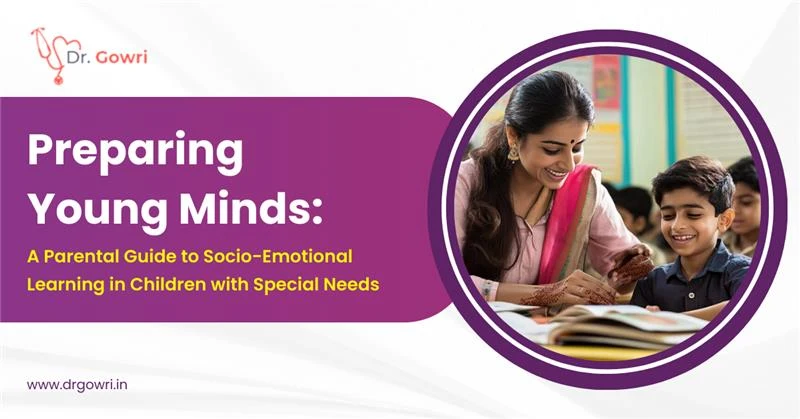“Emotions matter. They influence our decisions, relationships, and well-being.”
Think about a child who feels upset but doesn’t know how to express it or wants to make friends but struggles to start a conversation. Socio-emotional learning (SEL) is crucial for all children, including those with special needs. It focuses on developing skills that help children understand and manage their emotions, establish positive relationships, and make responsible decisions. As parents, you play a vital role in fostering these skills in your children.
Five Core Competencies of SEL:
- Self-awareness – Is about recognizing one’s emotions, thoughts, and values. Within the five core competencies, self-awareness is essential as it not only fosters optimism and responsible decision-making but also provides a foundation to establish and maintain healthy relationships with others.
- Self-management – This means regulating emotions, managing stress, and exhibiting self-discipline. It can also mean improving areas like stress management, organizational skills, goal-setting abilities, impulse control, and self-discipline.
- Social awareness – Understanding others’ perspectives and showing empathy. This can help the child to establish and maintain healthy relationships and social interactions and therefore have a positive impact on their family, school, and community.
- Relationship skills – Building and maintaining healthy relationships. This encompasses a range of skills, such as active listening, clear and effective communication, willingness to compromise, capacity to acknowledge and respect the emotions, thoughts, and values of others, as well as the ability to view situations from another person’s perspective and empathize with them.
- Responsible decision-making – Making ethical and constructive choices. It requires the child to consider the consequences of different potential actions, understand their strengths and limitations, and know when to ask for more help when needed in making certain important decisions.
Children with special needs may face unique challenges in developing these skills due to cognitive, sensory, or communicative differences. However, with targeted interventions, they can acquire socio-emotional competencies that significantly enhance their quality of life.
Strategies for Parents to Empower Socio-Emotional Learning among Their Young Minds:
Parents are the primary facilitators of SEL in children. Their involvement can shape emotional regulation, communication, and interpersonal skills. Research suggests that consistent parental support fosters better emotional well-being and social adjustment in children with disabilities.
1. Create a Supportive Environment
A nurturing and supportive home environment lays the foundation for healthy socio-emotional development. Parents should aim to create a safe space where children feel free to express their emotions without fear of judgment. This can be facilitated through open communication, active listening, and validating the child’s feelings.
2. Model Positive Behaviour
Children learn by observing. Demonstrate healthy emotional expression, conflict resolution, and empathy in your interactions. Parents who skillfully manage their own emotions set an example for their children, encouraging similar habits.
3. Encourage Play-Based Learning
Play is a vital tool for children’s development, particularly when it comes to building socio-emotional skills. Engaging in play allows children to practice interactions, negotiate, and develop problem-solving skills. Role-playing scenarios can be more effective.
4. Use Visual Supports
Visual aids such as charts or pictures for example., using the chart of emotional wheel can help children recognize emotions and learn appropriate social responses. For instance, feelings charts can help children identify and label their emotions.
5. Encourage Peer Interaction
Parents should try their best to create opportunities for playdates, group activities, or extracurricular activities that cater to the child’s variety of interests and abilities. Such opportunities not only help children develop social skills but also foster friendships that can improve their self-esteem levels.
6. Promote Mindfulness Practices
Mindfulness practices, such as deep breathing or meditation, can be valuable tools for promoting emotional regulation. Introducing these practices into daily routines can help children learn to manage anxiety, improve focus, and enhance their overall emotional health.
7. Seek Professional Support
If needed, consider enlisting the help of therapists or counselors who specialize in SEL to share insights about your child’s needs and seek guidance on effective strategies.
On an Ending note.,
Supporting your child’s socio-emotional learning journey is a collaborative effort that requires patience and understanding. By implementing these strategies and fostering a nurturing environment, you can help your child navigate their emotions and develop meaningful relationships, leading to greater success in both their personal and academic lives.
Ultimately, the goal is to empower young minds, enabling them not only to confront challenges but to find joy in their interactions and experiences.
Remember, every small step counts!
About the Author

Dr. Gowri Ravi Chinthalapalli is a Developmental and Family Physician with over 16 years of experience in child development and family medicine. She has treated more than 50,000 patients worldwide. After completing her MBBS from Rajiv Gandhi University of Health Sciences, she pursued MRCGP from the UK and gained wide experience in primary care and emergency medicine. She also holds a Fellowship in Child Development from the Centre for Child Development and Disabilities, Bengaluru. Dr. Gowri currently practices at Aster CMI Hospital and Canara Diagnostic Centre, Bengaluru. She is passionate about guiding families, supporting children with developmental needs, and providing holistic care.

